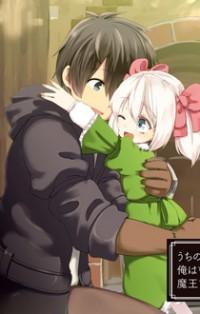5.0
24 votes
|
||||||||||
Latest chapters more
-
For My Daughter, I Might Even Be Able to Defeat the Demon King vol.6 ch.33.51216Oct 04, 2020
-
For My Daughter, I Might Even Be Able To Defeat The Demon King Vol.6 Chapter 33: Residents Of Krax, Receiving The Young Girl's Letter950Jul 31, 2020
-
For My Daughter, I Might Even Be Able To Defeat The Demon King Vol.6 Chapter 32: Young Girl, Enjoying The Fluffiness700Jul 13, 2020
-
For My Daughter, I Might Even Be Able to Defeat the Demon King vol.6 ch.31844Jun 06, 2020
-
For My Daughter, I Might Even Be Able to Defeat the Demon King vol.6 ch.30829Jan 29, 2020
|
5.0
24 votes
|
|
||||||||||
Synopsis
Post more
 |
Kyon
Aug 17, 2018
|
#FOR-MY-DAUGHTER-I-MIGHT-EVEN-BE-ABLE-TO-DEFEAT-THE-DEMON-KINGWarning!!!
Cuteness Overload!!!
Cuteness Overload!!!
 |
ArchNightWolf
Aug 12, 2018
|
#FOR-MY-DAUGHTER,-I-MIGHT-EVEN-BE-ABLE-TO-DEFEAT-THE-DEMON-KINGso cuteeeee.
 |
Alan Luiz
Aug 15, 2022
|
Ukraine War: The Donbas body collector who has lost count
Aleksey Yukov standing next to the white van, marked with a red cross
Image caption,
Aleksey Yukov and his men recover dead bodies of Ukrainian and Russian soldiers killed in combat in the Donbas
Aleksey Yukov has lost count of the bodies he's recovered in the Donbas over the past five months. He says he thinks it's more than 300, but he can't be sure.
Aleksey and his men drive a refrigerated white van, marked with a red cross, to carry out their work. They often drive towards danger to collect the bodies and remains of dead Ukrainian and Russian troops and civilians.
"We work with no days off. Constantly. We drive, we investigate, we transport, we search, all the time," he says.
It's grim work too - digging up the decomposing bodies of Russian soldiers buried in shallow trenches, or gathering their remains from burnt out armoured vehicles.
According to the United Nations, more than 5,000 Ukrainian civilians have been killed since Russia invaded in February.
There are no official figures for how many Ukrainian troops have died. But one adviser to President Zelensky told the BBC last month that between 100-200 Ukrainian soldiers were being killed every day. On average it's at the lower end of that scale.
Aleksey says that figure sounds realistic to him. But he believes the Russians are losing three times that number.
One Ukrainian soldier we spoke to, who had fought in Severodonetsk, described Russian tactics as similar to the First World War - with waves of their infantry running into a hail of bullets.
Smoke rising near homes in Donbas
Image caption,
Smoke rises near homes in the eastern Donbas region, where Russia has targeted its ground offensive
Who does Aleksey think is winning the war? "It's not about who is winning," he says. "It's about who's right. They [Russia] came here and that was unforgivable".
Every Ukrainian soldier we spoke to said they still believed they could win. Even in units that had suffered combat casualties of more than half of the troops.
But it's taking its toll on the living as well as the dead. Aleksey hasn't seen his one-year-old daughter for months.
"This war has ruined the life you had and the one you've been building," he says.
He adds that at the end of the day it all catches up: "That feeling when you are empty inside. The unfillable void".
Why Russia wants to seize Ukraine's eastern Donbas
Death comes quickly in the Donbas. Russian shells take mere seconds to land, and they're being used in industrial quantities. On average Russia is firing 20,000 artillery shells a day. Ukraine is able to respond with just 6,000.
There's no respite from the sound of heavy shelling at a military medical station we visit. The chief medical officer - who only wants to be known as Dr Anatoliy for his own safety - describes the situation on the frontline as "fragile".
He shows us photographs of a badly damaged military ambulance - riddled with bullet holes and torn to shreds by shrapnel. Dr Anatoliy says the red cross painted on their vehicles mean nothing to Russians. Two more ambulances are waiting outside the building under camouflage nets - ready to go to pick up the injured.
Tina packing a military bag inside an ambulance
Image caption,
Before volunteering to join the army Tina worked at a children's hospital
We meet Tina and Polina, two front line medics.
Tina used to work at a children's hospital before she volunteered to join the army. She wipes away tears as she talks about the family she's now missing.
"The pain goes away, because you have a task: to get a person to a hospital alive" she says. I ask if she's scared. "Of course it's scary. When a shell lands nearby, everything shrinks inside you".
For every soldier killed many more are injured. Tina says she's not allowed to give numbers but adds "there are casualties almost every day, and not just one. Sometimes many, sometimes a lot".
Polina standing near a vehicle
Image caption,
Twenty-one-year-old Polina says she exercises and listens to music to keep some sense of normality
Polina is just 21. The war's already cast a big shadow over her short life.
Her father and uncle are now prisoners in Russian-occupied Ukraine. She says she's trying her best not to let it get her down. She exercises and listens to music whenever she can - just to keep some sense of normality.
But Polina admits it's hard not to feel gloomy and depressed: "Apart from the bullets flying over your head, wounded people - and those wounded are often my friends and buddies - if you're taking it to heart it's going to be tough".
It's the troops she treats who give her hope.
"The guys who are injured and exhausted don't even want to go to hospital sometimes. They say I'm not going to leave my mates, we're holding the line together".
line
War in Ukraine: More coverage
RUSSIA: Stop the fighting: Russian soldier's mum speaks out
WATCH: War nears Ukraine maternity ward
ANALYSIS: Is the tank doomed?
READ MORE: Full coverage of the crisis
Aleksey Yukov standing next to the white van, marked with a red cross
Image caption,
Aleksey Yukov and his men recover dead bodies of Ukrainian and Russian soldiers killed in combat in the Donbas
Aleksey Yukov has lost count of the bodies he's recovered in the Donbas over the past five months. He says he thinks it's more than 300, but he can't be sure.
Aleksey and his men drive a refrigerated white van, marked with a red cross, to carry out their work. They often drive towards danger to collect the bodies and remains of dead Ukrainian and Russian troops and civilians.
"We work with no days off. Constantly. We drive, we investigate, we transport, we search, all the time," he says.
It's grim work too - digging up the decomposing bodies of Russian soldiers buried in shallow trenches, or gathering their remains from burnt out armoured vehicles.
According to the United Nations, more than 5,000 Ukrainian civilians have been killed since Russia invaded in February.
There are no official figures for how many Ukrainian troops have died. But one adviser to President Zelensky told the BBC last month that between 100-200 Ukrainian soldiers were being killed every day. On average it's at the lower end of that scale.
Aleksey says that figure sounds realistic to him. But he believes the Russians are losing three times that number.
One Ukrainian soldier we spoke to, who had fought in Severodonetsk, described Russian tactics as similar to the First World War - with waves of their infantry running into a hail of bullets.
Smoke rising near homes in Donbas
Image caption,
Smoke rises near homes in the eastern Donbas region, where Russia has targeted its ground offensive
Who does Aleksey think is winning the war? "It's not about who is winning," he says. "It's about who's right. They [Russia] came here and that was unforgivable".
Every Ukrainian soldier we spoke to said they still believed they could win. Even in units that had suffered combat casualties of more than half of the troops.
But it's taking its toll on the living as well as the dead. Aleksey hasn't seen his one-year-old daughter for months.
"This war has ruined the life you had and the one you've been building," he says.
He adds that at the end of the day it all catches up: "That feeling when you are empty inside. The unfillable void".
Why Russia wants to seize Ukraine's eastern Donbas
Death comes quickly in the Donbas. Russian shells take mere seconds to land, and they're being used in industrial quantities. On average Russia is firing 20,000 artillery shells a day. Ukraine is able to respond with just 6,000.
There's no respite from the sound of heavy shelling at a military medical station we visit. The chief medical officer - who only wants to be known as Dr Anatoliy for his own safety - describes the situation on the frontline as "fragile".
He shows us photographs of a badly damaged military ambulance - riddled with bullet holes and torn to shreds by shrapnel. Dr Anatoliy says the red cross painted on their vehicles mean nothing to Russians. Two more ambulances are waiting outside the building under camouflage nets - ready to go to pick up the injured.
Tina packing a military bag inside an ambulance
Image caption,
Before volunteering to join the army Tina worked at a children's hospital
We meet Tina and Polina, two front line medics.
Tina used to work at a children's hospital before she volunteered to join the army. She wipes away tears as she talks about the family she's now missing.
"The pain goes away, because you have a task: to get a person to a hospital alive" she says. I ask if she's scared. "Of course it's scary. When a shell lands nearby, everything shrinks inside you".
For every soldier killed many more are injured. Tina says she's not allowed to give numbers but adds "there are casualties almost every day, and not just one. Sometimes many, sometimes a lot".
Polina standing near a vehicle
Image caption,
Twenty-one-year-old Polina says she exercises and listens to music to keep some sense of normality
Polina is just 21. The war's already cast a big shadow over her short life.
Her father and uncle are now prisoners in Russian-occupied Ukraine. She says she's trying her best not to let it get her down. She exercises and listens to music whenever she can - just to keep some sense of normality.
But Polina admits it's hard not to feel gloomy and depressed: "Apart from the bullets flying over your head, wounded people - and those wounded are often my friends and buddies - if you're taking it to heart it's going to be tough".
It's the troops she treats who give her hope.
"The guys who are injured and exhausted don't even want to go to hospital sometimes. They say I'm not going to leave my mates, we're holding the line together".
line
War in Ukraine: More coverage
RUSSIA: Stop the fighting: Russian soldier's mum speaks out
WATCH: War nears Ukraine maternity ward
ANALYSIS: Is the tank doomed?
READ MORE: Full coverage of the crisis
You May Also Like
























